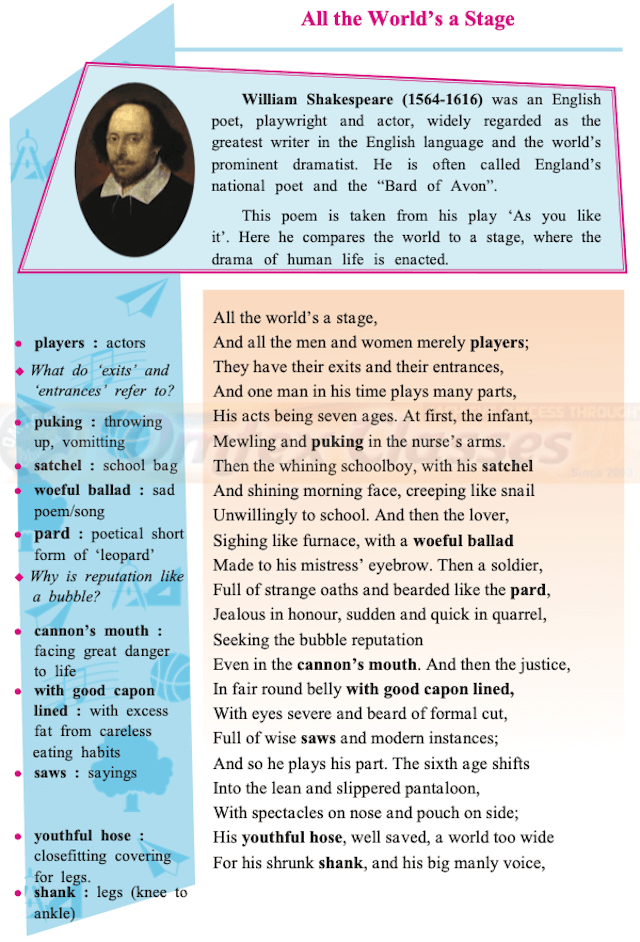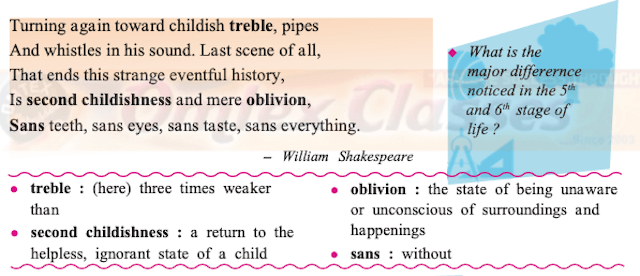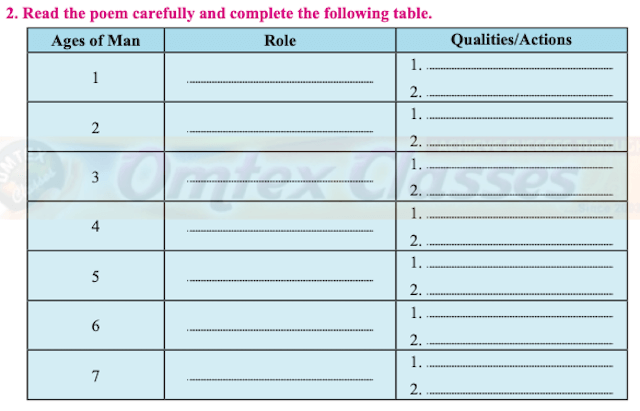Maharashtra State Board Class 10 English
Kumar Bharati Textbook Solutions: Unit 1.4 - All the World’s a Stage
Warming Up!
Pair up with your partner and name the following:
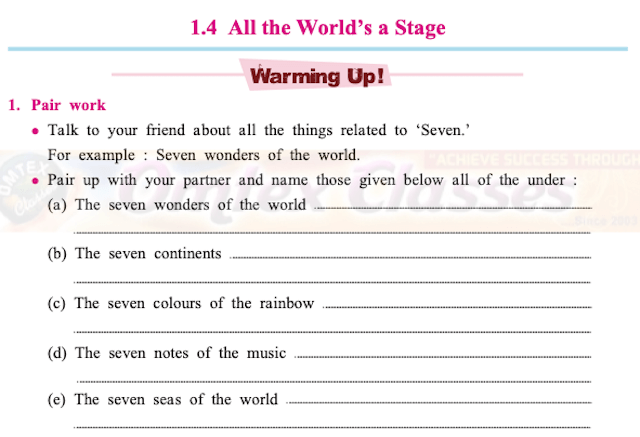
- The Seven wonders of the world- _________
- The Seven continents - ____________
- The Seven colours of the rainbow- ________
- The Seven notes of the musical scale- ________
- The Seven seas of the world - ________
- The Seven wonders of the world- The Great Wall of China, Christ the Redeemer Statue, Machu Picchu, Chichen Itza, The Roman Colosseum, The Taj Mahal and Petra Asia, Europe.
- The Seven continents- Asia, Australia, Africa, North America, South America, Antarctica, Europe.
- The Seven colours of the rainbow- violet, indigo, blue, green, yellow, orange, red.
- The Seven notes of the musical scale- sa re-ga-ma-pa-da-ni.
- The Seven seas of the world- Arctic Ocean, Antarctic Ocean, North Atlantic Ocean, South Atlantic Ocean, Indian Ocean, North Pacific Ocean, South Pacific Ocean.
Life is often compared to many things. Write down 7 things that life can be compared to and justify the comparison. For example,

- Life is a keyboard; if you press the right keys. you have typed a good destiny.
- _____________________
- _____________________
- _____________________
- _____________________
- _____________________
- _____________________
- Life is a keyboard; if you press the right keys. you have typed a good destiny.
- Life is a river - always flowing, sometimes calm, sometimes turbulent.
- Life is like a seed - It will never grow unless planted, nourished and nurtured.
- Life is like an elevator - with lots of ups and downs, but you can choose which floor to get off on.
- Life is like an onion - You peel off layer after layer, and sometimes it makes you weep.
- Life is like a jigsaw puzzle - You have all the pieces, but you have to put them together correctly.
- Life is like a jack-in-the-box - You never know when you are going to get a surprise.
Match the approximate ages with the stages.

| No | Age-group | Stages | |
|---|---|---|---|
| 1 | Birth to 2 years | a | teenage/adolescence |
| 2 | 3 years to 12 years | b | old age/second childhood |
| 3 | 13 years to 17 years | c | middle - age |
| 4 | 18 years to about 44 years | d | babyhood/infancy |
| 5 | About 45 years to 60 years | e | senior citizen/elderly person |
| 6 | 65 years up to 75 to 80 years | f | adulthood |
| 7 | Above 80 years | g | childhood |
| No | Age-group | Match | Stages |
|---|---|---|---|
| 1 | Birth to 2 years | d | babyhood/infancy |
| 2 | 3 years to 12 years | g | childhood |
| 3 | 13 years to 17 years | a | teenage/adolescence |
| 4 | 18 years to about 44 years | f | adulthood |
| 5 | About 45 years to 60 years | c | middle-age |
| 6 | 65 years up to 75 to 80 years | e | senior citizen/ elderly person |
| 7 | Above 80 years | b | old age/second childhood |
English Workshop
Read the words in given clouds. Match them with what they signify.
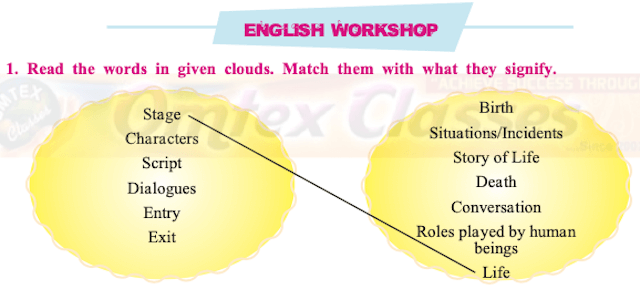
| Column A | Column B |
|---|---|
| (a) Stage | 1. Birth |
| (b) Characters | 2. Situations/Incidents |
| (c) Script | 3. Story of Life |
| (d) Dialogues | 4. Death |
| (e) Entry | 5. Conversation |
| (f) Exit | 6. Roles played by human beings |
| 7. Life |
| Column A | Column B |
|---|---|
| (a) Stage | 7. Life |
| (b) Characters | 6. Roles played by human beings |
| (c) Script | 3. Story of Life |
| (d) Dialogues | 5. Conversation |
| (e) Entry | 1. Birth |
| (f) Exit | 4. Death |
| Stage | Role | Qualities/Actions |
|---|---|---|
| 1 | Infant | frightened, crying, puking |
| 2 | Schoolboy | unhappy, whining, creeping unwillingly to school |
| 3 | Lover | woeful, sighing, singing sad ballads |
| 4 | Soldier | jealous in honour, ambitious, quarreling, facing danger |
| 5 | Justice (Judge) | fat, serious and wise, giving advice |
| 6 | Old Man | thin and shrunken, talking in a shrill voice |
| 7 | Very Old Man | senile, child-like, oblivious to his surroundings |
Write down in your own words the differences between the following stages of a man's life.

- 2nd stage and the 4th
- 3rd stage and 5th stage
- 1st stage and 7th (last) stage
-
2nd stage (Schoolboy) and the 4th (Soldier):
The second stage is that of a complaining and crying schoolboy who goes to school unwillingly. He is innocent and hesitant. In contrast, the fourth stage is an aggressive soldier, full of confidence and strange oaths. He is ambitious, quick to quarrel, and willing to risk his life for reputation. -
3rd stage (Lover) and 5th stage (Justice):
The third stage is that of a passionate lover, sighing and singing sad songs for his beloved. He is driven by emotion. The fifth stage, however, is a mature, formal, and wise middle-aged man. He is stern, full of wisdom, and offers advice, representing experience and judgment over youthful passion. -
1st stage (Infant) and 7th (last) stage (Very Old Man):
These two stages are strikingly similar. The first stage is an infant, completely dependent, helpless, and unaware, without teeth, vision, or taste. The last stage mirrors this, described as a "second childhood." The man becomes senile, once again dependent and oblivious to the world, "sans teeth, sans eyes, sans taste, sans everything."
Pick out lines that contain Imagery (a picture created in the mind by using words) of the following people.

- School boy (2nd stage):
"The whining schoolboy, with his satchel and shining morning face, creeping like a snail unwillingly to school." - Soldier (4th stage):
"Full of strange oaths and bearded like the pard, Jealous in honour, sudden and quick in quarrel." - Judge (5th stage):
"In fair round belly with good capon lined, With eyes severe and beard of formal cut." - Senior citizen (6th stage):
"His youthful hose, well-saved, a world too wide For his shrunk shank..."
You will notice that there is no Rhyme-scheme in the poem. It appears similar to the poem 1.1 ‘Where the Mind is Without Fear’ by Tagore... Shakespeare uses lines with a steady rhythm of 5 beats in each. It is termed as Blank Verse. Copy the lines from “And all the men and women merely players” to “sudden and quick in quarrel”. Put a stress mark on each of the syllables stressed in the lines...

This is a practical exercise for students to complete on their own.
Think and write on your own.

- What is the theme/central idea of this poem?
- Which two stages of man, described by Shakespeare, sound humorous? Say why.
- The last (7th) stage of life sounds very sad and miserable. How can you make old age also cheerful and happy?
- Theme/Central Idea: The central theme of the poem is the cycle of life. Shakespeare presents life as a play on a stage, where every human being plays seven distinct roles, from the helplessness of infancy to the helplessness of extreme old age, ultimately highlighting the transient and predictable nature of human existence.
- Humorous Stages: The stages of the schoolboy and the lover sound humorous. The image of a complaining boy with a shiny, clean face "creeping like a snail" to school is comical. Similarly, the lover "sighing like a furnace" and writing sad poems to his "mistress' eyebrow" is an exaggerated and amusing depiction of youthful romance.
- Making Old Age Cheerful: While Shakespeare portrays the final stage as bleak, old age can be made cheerful and happy by staying socially connected with family and friends, engaging in hobbies and activities that bring joy, maintaining physical and mental health through gentle exercise and learning, and sharing one's wisdom and experiences with younger generations. A positive outlook and the love of family can make it a peaceful and fulfilling time.
- world - a stage
- actors - men and women (players)
- birth and death - entrances and exits
- school boy - a snail
- the lover's sigh - a furnace
- spotted leopard - bearded soldier
- last stage (old age) - second childishness
- Simile:
1. "...creeping like snail"
2. "Sighing like furnace..." - Onomatopoeia:
1. "Mewling and puking in the nurse's arms."
2. "And his big manly voice, Turning again toward childish treble, pipes And whistles in his sound." - Alliteration:
1. "...sudden and quick in quarrel" (consonance of 'k' sound)
2. "For his shrunk shank..." - Metaphor:
1. "All the world's a stage"
2. "And all the men and women merely players" - Inversion:
1. "With a woeful ballad / Made to his mistress’ eyebrow." (Correct order: Made a woeful ballad...)
2. "With spectacles on nose and pouch on side" (Correct order: With spectacles on the nose...) - Transferred Epithet:
1. "With a woeful ballad" (The ballad is not woeful; the lover is.)
2. "...lean and slipper'd pantaloon" (The pantaloon (old man) is wearing slippers, not that the man himself is 'slippered'.)
Read the summary of the play ‘As You Like It’ by William Shakespeare using the Internet. Find out which character has narrated the above poem and on what occasion. Also, make a list of all the characters of the play.

The poem is narrated by the character Jaques, a melancholic lord, in Act II, Scene VII of the play 'As You Like It'. He delivers this speech to Duke Senior in the Forest of Arden.
Main Characters in 'As You Like It': Rosalind, Orlando, Duke Senior, Duke Frederick, Celia, Touchstone, Jaques, Oliver, Silvius, Phoebe, Audrey, and Corin.
The poem 'All the World's a Stage' by William Shakespeare, taken from his play 'As you like it', is a profound monologue about the journey of human life. The central theme is the cycle of life, which Shakespeare masterfully compares to a play. He suggests that the world is a stage, and all humans are merely actors playing their assigned roles through seven different ages. This extended metaphor gives the poem its unique structure and depth.
The poem is written in blank verse i.e. there is no rhyme scheme, but there is a steady rhythm of five beats in each line. This gives it a natural, speech-like quality. There are many figures of speech, like Simile, Alliteration and Repetition, but the one that stands out is Metaphor. In the lines 'All the world's a stage. And all men and women are merely players', there is an implied comparison between two different things.
The special feature of the poem is the imagery. Many of the lines create a picture before our eyes and help us to imagine the seven stages in man's life. The narrative style gives continuity to the poem, where one stage smoothly goes into the next. This is one of the most famous and quoted poems of Shakespeare. My favourite line is 'All the world's a stage, And all men and women are merely players.' I like this line because it describes correctly how we must look at life. I like the poem because it shows us the cycle of life, of which everyone is a part.
